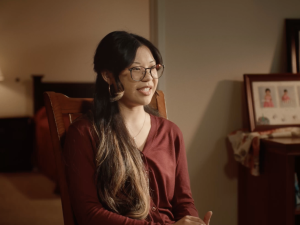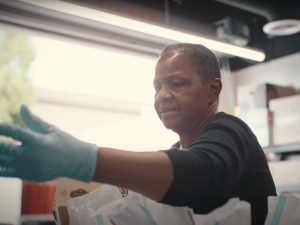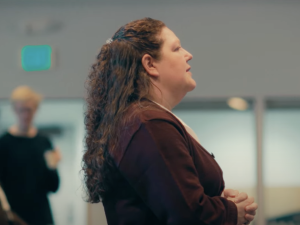It all started when Aaron Needham heard a pop in his back while working at his father’s stained glass company. The injury required surgery, he was prescribed opiates, and the rest was history.
His life became about heroin, guns, criminality, and violence.
But through it all, his father never gave up on him. And eventually, when all else was lost, his dad answered his call, and took him to treatment at The Salvation Army in San Francisco, CA.
Below is a transcript of the video, edited for readability.
Aaron Needham: My dad is a tremendous artist. He opened a stained glass studio. I would work there, and I came to manage the studio.
It is a little bit demanding on your body, because you’re hunching over, you’re cutting glass all day. And I felt a ping one day. And then I had a real invasive back surgery.
Got some pills, and then I went through them really quick. I started getting more and more norcos, hydrocodone, OxyContin, Xanax, methadone, suboxone. You’re forever trying to chase some feeling that maybe you got early on, but you never quite get there, so it’s never quite enough.
Got married and we discovered that we couldn’t really have children. So I had this clear thought, if I’m not going to have kids, what difference does it make?
So I started trying heroin.
Some pretty scary lifestyle choices that go hand-in-hand with that. Escalating criminality, guns, violence. I just became someone entirely … I don’t even know who that guy was.
Ultimately, the Interagency Narcotics Task Force, they showed up, you know, like 30 people kicked down the door. Front page of the paper was my wife and I. And that was really the nail in the coffin of our marriage.
Find myself incarcerated. Ten days – get out. Twenty days – get out. Then getting new charges – get out. And before I could even get to the gate, I would already be acting like a junkie. Start doing kind of junkie movements, be antsy, I’d start aching everywhere. Sometimes I would be back using on the bus ride home because I’d see somebody I knew.
This last time I got out, I had one week to get into treatment. I ended up going to my parents’ house. My dad was the last one that really hadn’t just totally given up. I had broke down to him. “You know what? I want to stop, but I can’t. I can’t stop.”
Later that night, I was just walking and walking, getting closer and closer in proximity to this trap house. I went back in and I didn’t leave there for three days. And I got high. Just crazy. The last night I was there, I spent the night in the emergency room because the girl I was seeing, she had these abscesses and sores on her legs from shooting up. All night with her on the hospital gurney.
And I’m telling her, “I’m leaving. I’m going to treatment.” She didn’t want me to leave. And my dad called me, “Where are you at?” He said, “We’re going.” I knew that if I stayed, I had death waiting for me.
So as we’re coming over the Bay Bridge and I’m looking at the homeless people South of Market, and I’m like, “Dang, it’s rough out here.” I was like, “Maybe I can hustle up some kind of pistol or get involved with people, secure some drugs, something…” Because that seemed more reasonable than the idea that I was going to be able to survive being in a program.
He dropped me off here. The Harbor Light Center. So they walked me through the grounds. I’m like, all these flowers and trees. It’s so beautiful and sun’s shining. And I felt, like, kind of brand new. Then we go around the corner to detox, and it’s a bunch of people in gray sweatpants, scowling, smoking cigarettes, mean-mugging. I’m like, “Yeah, this is my place. This is where I belong.”
Somebody told me something really powerful, “If you want God to enter your life, just ask.” So I did. I think under these trees, in this courtyard, I prayed. It unlocked everything. It’s that personal relationship with God.
I had a therapist, classes daily, twelve steps, spirituality. I learned to embrace everybody, even in their difficult time, as I was going through a difficult time.
I went into The Way Out program.
So The Way Out was an extended period that really focused on the housing and the career development, and it was really about the long-term. I learned so much, and I started waking up with joy, peace, hope.
Friendship House is very similar to Harbor Light. I started working as a case manager there. Now I can facilitate the anger management courses. Coming up on a year, I’ll have my counseling certification.
My dad, he doesn’t have to worry about me anymore. “Things are going really good. Dad’s wearing blue blockers. What’s going on?” He doesn’t have to get a call from county jail or to get a call that I’m dead or OD’d.
I had one of the most powerful moments of my life in that chapel right there. My mom and dad attending and kind of celebrating my, I think, two years of recovery. Everybody was crying. It was great.
Recovery works. It doesn’t come in a pill bottle … there’s no chemical solution to a spiritual problem. Get out of your head. Say you’re sorry. Wash your hands. Don’t call that girl. Nobody’s gang stalking you … you’re not that interesting. Just sit down and do some recovery, and it’s going to work out. And it’ll be the best thing you ever did.
Do Good:
- See more videos like this in our video feed.
- Are you a Do Gooder, someone who cares about bringing goodness into the life of your family and community? Subscribe to The Do Gooders Podcast to be inspired by those doing good and find tangible tips for simple actions you can take today.
- Did you know The Salvation Army served more than 23 million Americans last year fighting hunger, homelessness, substance abuse and more—all in a fight for good? Where can you help? Take our quiz to find your cause and learn how you can join in today.













